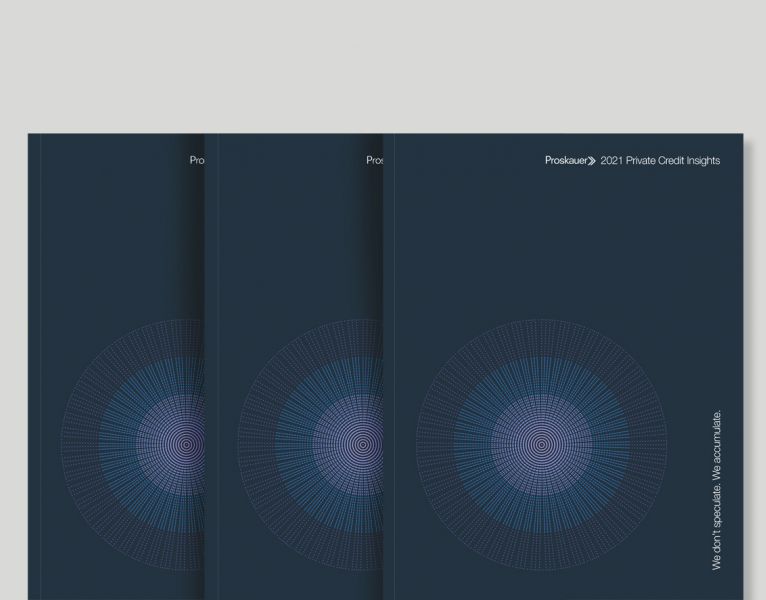NEW YORK, January 26, 2023 – Proskauer, a leading international law firm, today announced the results of its Q4 Private Credit Default Index, a quarterly report that tracks defaults among loans. The report, which looked at defaults from October 1, 2022 - December 31, 2022, revealed a default rate of 2.06%, an increase from the previous quarter’s rate of 1.56%, and the second straight quarter for which the rate increased. Prior to Q3 2022, rates had generally trended downward each quarter since reaching a peak of 8.1% in Q2 2020.
In addition to the overall default rate, the Index analyzed default rates by EBIDTA. Companies with more than $50 million of EBITDA at the time of origination had a 1.5% default rate in Q4 2022, up from 1.1% in Q3 2022. Companies with $25-49.9 million of EBITDA had a 1.7% default rate, a decrease from 2.1% in Q3 2022. Companies with less than $25 million of EBITDA had a 2.7% default rate, a new high for the year and an increase from 1.5% in Q3 2022.
The Private Credit Default Index also revealed new industry dynamics. Health care/life sciences and food & beverage, which both saw significant changes from Q2 to Q3, remained relatively steady as the year ended. Health care/life sciences’ rate was 0.6% in Q2, rose to 2.4% in Q3 and then dipped slightly to 2.3% for Q4. Food & beverage had a default rate of 3.7% in Q2, decreased to 1.8% in Q3 and remained there in Q4. However, both manufacturing and consumer goods and services/retail had significant increases in their defaults from last quarter, jumping from 0.8% to 2.5% and from 3.5% to 4.6%, respectively.
Proskauer’s Private Credit Default Index tracks senior-secured and unitranche loans in the United States. The Index includes approximately 973 active loans, representing $145.65 billion in original principal amount. The full report, which is only available to the firm’s direct lending clients, also contains an apples-to-apples comparison to the default rates published by the rating agencies, historical trends by industry and EBITDA bands, defaults by default type, defaults in cov-lite loans and defaults by year of origination.
Methodology
Our Index is based on U.S. dollar denominated senior secured and unitranche loans. Default rates are calculated by dividing the number of defaulted loans by the aggregate number of loans in the Index.
While there are varying conventions of what is considered a default for purposes of calculating a default rate, the Index includes loans that have a payment, financial covenant or bankruptcy default, loans that are otherwise in default if the default is expected to continue for more than 30 days (excludes immaterial defaults) and loans that were amended in anticipation of a default. A default is assumed to take place on the earliest of:
- The date a debt payment was missed
- The date a distressed restructuring occurs
- The date the borrower filed for, or was forced into, bankruptcy
- The date a financial covenant default occurs
- The date that a default occurs if that default is expected to continue for more than 30 days (excludes immaterial defaults)
- The date the loan is modified in anticipation of a default
For the purposes of the Index, if a borrower re-emerges from bankruptcy, or otherwise restructures its defaulted debt, and reestablishes regular, timely payment of all its debts, we reclassify the borrower as a non-defaulted borrower, as of the date of emergence or restructure.
About Proskauer
We are 800+ lawyers serving clients from 12 offices located in the leading financial and business centers in the Americas, Europe and Asia. The world’s leading organizations, companies and corporations choose us to be their representatives in their most critical situations. But more, they consider Proskauer a strategic partner to drive their business forward. We work with asset managers, major sports leagues, Fortune 500 companies, entertainment industry legends and other industry-redefining companies.
The Firm’s Private Credit Group is made up of cross-disciplinary finance and restructuring experts exclusively dedicated to private credit investors. It includes over 90 finance and restructuring lawyers focused on representing credit funds, business development companies and other direct lending funds in the restructuring of “clubbed” and syndicated credits, preferred equity, special situations and alternative investments. Over the past five years, Proskauer has been involved in more than 1,000 deals for over 75 private credit clients across the United States and Europe with an aggregate transaction value exceeding $250 billion.


